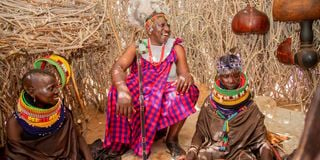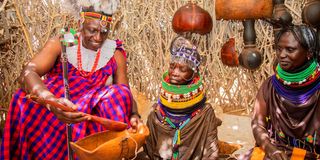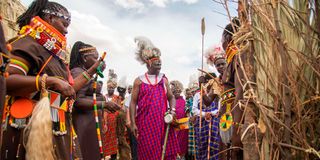Premium
Turkana disappointed as Ugandan and Pokot leaders skip festival

President William Ruto during the Turkana Cultural and Tourism Festival in Lodwar town.
What you need to know:
- The county is known as the cradle of humanity after paleoanthropologists discovered a complete human fossil.
- Festival was meant to promote peaceful coexistence with the Pokot community from Baringo and West Pokot counties.
As the three-day Turkana Tourism and Cultural Festival, Tobong'u Lore, draws to a close, concerns remain over the failure of some leaders to grace the festival, which is meant to promote peace and unity between the Turkana and their neighbours within and outside Kenya.
Tobong'u Lore, which means 'welcome home', was held in Lodwar from Thursday, with President William Ruto arriving on the eve of the festival and attending in traditional Turkana dress.
The county is known as the cradle of humanity after paleoanthropologists discovered a complete human fossil, known as the Turkana Boy, in Nariokotome village. It is believed that humanity originated in this area.
President Ruto spent time meeting with Turkana professionals and leaders who listed the community's main concerns about insecurity with neighbours in bordering Uganda, South Sudan and Ethiopia, as well as West Pokot, Samburu and Baringo counties.

President William Ruto during the Turkana Cultural and Tourism Festival in Lodwar town.
The main objective of the festival was to provide an opportunity for the people of Turkana to promote unity with their neighbouring communities - the Jie, Karamoja, Toposa, Nyangatom and Teso - with whom they share common ancestry, traditions, language and other cultural features.
It was also meant to promote peaceful coexistence with the Pokot community from Baringo and West Pokot counties.
However, Turkana residents were disappointed to learn that there were no leaders from the Pokot community and neighbouring pastoralist communities in Uganda.
"In the previous events, we used to have top government officials from Uganda including members of Parliament, ministers and heads of security after First Lady Janet Museveni in 2015 led a delegation from her country during the second edition of the festival that was also graced by former Kenya First Lady Margaret Kenyatta a situation that cemented peaceful coexistence and boosted cross border trade. We expected high-ranking officials from Uganda to be present so that leaders capitalise on the festival to resolve the underlying causes of renewed animosity," said Mr Joseph Ekidor, a resident of Loima subcounty.
The Chief Administrator of South Omo Zone, Milike Malika, who led a delegation from Ethiopia, and the Governor of Eastern Equatoria State, Louis Lobong Lojore, who led a delegation from South Sudan, said they were committed to peacebuilding for sustainable economic development.
"We have banked on the festival to promote peace and unity among ateker communities. Since inception of the event, cattle rustling activities have reduced drastically with both governments providing excellent bilateral relations. I appeal to both Presidents to demarcate their common border in respect to 2019 Memorandum of Understanding (MoU) so that border communities benefit from their resources," said Mr Lojore.
He said with peaceful coexistence, Turkana County residents will be free to cross into South Sudan and engage in agriculture to address food insecurity caused by frequent droughts.

President William Ruto during the Turkana Cultural and Tourism Festival in Lodwar town.
There is currently a diplomatic row between Kenya and Uganda, which led to the sentencing of 32 Turkana residents to 10 years in prison by the 3rd Division Military Court Martial based in Moroto District in Uganda's northern region, for illegal possession of firearms, ammunition and crude weapons.
They were arrested on April 8 during a cordon and search operation by the Uganda People's Defence Forces (UPDF) and police in Nadunget subcounty, northern Uganda. Most of those arrested are Turkana pastoralists who had crossed the border in search of pasture and water.
Tensions escalated when President Yoweri Museveni later issued a six-month executive order banning Kenyan pastoralists from crossing the border to graze unless suspects in the killing of three geologists last year are handed over to Ugandan authorities for trial, leaving more than 30,000 pastoralists in Loima and Turkana West sub-counties to suffer from prolonged drought.
Domestically, Turkana Governor Jeremiah Lomorukai, County Speaker Christopher Nakuleu and MPs Nicholas Ngikor (Turkana East), Protus Akuja (Loima) and Namuar Emathe (Turkana Central) condemned increased bandit attacks in Turkana South and Turkana East sub-counties after bandits from Elgeyo Marakwet, West Pokot, Samburu and Baringo counties escaped a multi-agency security operation.
"The bandits are now terrorising residents of Kapedo, Lomelo, Ngilukia, Napeitom, Nadome and Katilia with some [residents] forced to flee to Lokori after schools and homes were destroyed. Deal with the bandits ruthlessly as my administration invests Sh105 million to resettle victims of banditry," said Mr Lomorukai.
He said the national government, with support from development partners, should work with the county government to construct water pans and dams along livestock migration routes, especially along the Kenya-Uganda border, to discourage Turkana pastoralists from crossing into northern Uganda.
President Ruto assured Turkana residents that he had recently met with President Museveni, who had agreed to talks to resolve the disputes.
Meanwhile, President Ruto was treated to grand rituals, traditions and displays of the rich Turkana culture at the festival, which he attended dressed in traditional Turkana dress and headgear adorned with ostrich feathers.
He toured a section with Turkana kraals where the traditional way of life of the community was demonstrated by clans from all the subcounties; from constructed traditional manyattas, tools used both in the kitchen, weapons, clothing, food and crafts.
The Loima Traditional Craft Artisans Group, with six members, had the opportunity to demonstrate to the President how they traditionally make fire using sticks (ngipip) from the Cordia sinensis tree 'edome', and how they made traditional shoes from dry cow, hippopotamus and buffalo skins. They also demonstrated their carpentry skills, making wooden spoons and plates.





